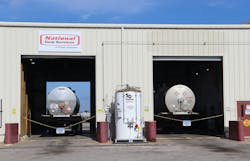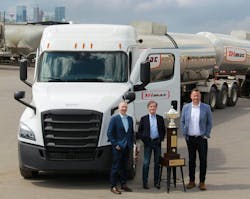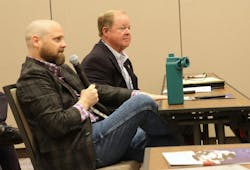Coup de grâce: Guariento leads Trimac to fourth Heil trophy
Bill Marchbank fumed in disbelief.
He’d just finished digesting a highly critical third-party assessment of Trimac Transportation’s safety culture following the June 2018 explosion of a fuel tanker at a maintenance facility—and couldn’t stomach the report’s assertion. “Trimac [already a two-time National Tank Truck Carriers safety champion at that point] doesn’t operate safely?” he wondered incredulously.
“Everyone involved was so mad they wanted me to fire the consultant,” recalled Marchbank, then chief operating officer. “I said, ‘Hold on, let me read it again.’ So I read it again that night, and I was still angry. Then I read it the next morning, and again at noon, and finally I called Matt [Faure, Trimac president and CEO] and said, ‘I know this is inflammatory, and it’s got our blood boiling, but if you scratch out all the provocative language, he’s not wrong.
“He is absolutely right about the way we need to go about making changes.”
Marchbank’s receptiveness, however reluctant it was initially, precipitated a safety renaissance for Trimac, which overhauled its safety program using a socio-technical approach in the aftermath of that “triggering event,” as Faure calls it. Soon thereafter, the family-owned carrier went on to claim its first NTTC safety championship in 12 years; and now Trimac is celebrating its fourth win since 2002 by further refining its signature safety program, better utilizing existing tools and technology, and pursuing continuous improvement through innovation.
Alex Guariento, then vice president of safety, accepted Trimac’s 2024 Harvison-division Heil trophy—which goes to a for-hire carrier with more than 15 million miles—during this year’s NTTC Annual Conference in Tampa. “We don’t do safety to win trophies,” Faure emphasized. “We do it because we want to be the safest company in this industry. We want to bring everybody home every day. That’s why we do safety. The trophy is a cherry on top. It’s the icing on the cake to be recognized by our peers for all the amazing work that everybody is doing.”
This victory is even sweeter for Guariento and Marchbank.
Guariento retired in June, at which point Marchbank—now the SVP of mergers and acquisitions integration—relinquished safety oversight to Ryan Collinge, who succeeded him as COO in 2023.
“It’s nice to go out as a champion,” Marchbank grinned.
“But what I’ve enjoyed most is watching the growth of everyone in this company. It’s been wonderful to see people embrace our ‘Rooted in Safety’ program.”
Rooted in safety
Three people were injured in the 2018 explosion in Newfoundland, Canada, which investigators attributed to the sparks from a welding torch igniting the fumes in a tanker while it was in the shop; but, miraculously, everyone survived, including the mechanic who was repairing a vapor recovery pipe under the trailer. “By the grace of God—nobody died,” said Guariento, who teamed with Trimac in 2020 after a long career in transport safety, including 14 years at Greyhound.
“But it caused us to really take an introspective look at how we do safety. How did this happen? What enabled it to happen? And what came out of that was we had very thorough procedures, but they were so complex they took too long, so people weren’t following them.
“They looked good on paper, put in practice, they didn’t work.”
Robert Beach, who retired in 2021, initiated the Rooted in Safety makeover, stepping in as VP of safety and risk management in July 2018 after more than 30 years in Trimac operations. The proactive program cultivates a safety-centric environment by encouraging employees to identify potential hazards before they spark sobering near misses. Key elements include studying the psychology behind safe behaviors; acknowledging the role managers and factors outside drivers’ control play in on-highway incidents; focusing on high-consequence events; and conducting investigations based on direction, competency, opportunity, and motivation (DCOM). “Basically, there are three legs to the stool—sensitivity to operations, organizational mindfulness, and measurable learning outcomes,” Marchbank summarized.
See also: Trimac acquires Service Transport Company
Guariento took the program to the next level, simplifying processes with employee feedback, reforming driver interactions—including how leaders differentiate mistakes from willful noncompliance—utilizing modern technology, and elevating safety above all other considerations. “His willingness to take the brunt of what comes with that, whether it’s from a customer, driver, or operator—in the name of safety progress—is a truly commendable trait,” Collinge said.
The organization’s inspirational reward is a DOT-recordable accident frequency that steadily improved each of the last five years—while Trimac expanded rapidly through 14 acquisitions—culminating with a company-record rate of 0.196 accidents per million miles in 2024. Stated more impressively, Trimac last year traveled 149 million miles while transporting nearly 700,000 liquid and dry bulk loads across seven time zones, often in snow, rain, or heavy traffic, in a fleet of 2,100 tractors and 4,200 tankers—with only 16 DOT-preventable accidents.
“Safety is the No. 1 priority here,” Guariento said. “There’s absolutely no doubt in my mind, from the top down in this company, nothing supersedes safety.”
Continuous improvement
Service with safety is a founding principle that remains a core value at Trimac under the leadership of Jeff McCaig, Trimac’s chairman of the board, and the grandson of Jack McCaig, who founded the company in 1945. His passion for safety filters down to Faure, Collinge, and the rest of Trimac’s executive team—whose unwavering support fuels constant advancement.
“If your leaders don’t expect safe operation, then you’re not going to get solid safety performance,” said Lance Hagler, who was selected to succeed Guariento as VP of safety in July. “One thing I respect about Matt and Jeff is how they push us. They don’t come to the safety department and say, ‘What do we need to do next to stay safe?’ They have ideas. They read articles, they look at what other people are doing, and they ask complex questions. That ensures we’re being progressive, looking ahead, and not resting on how we did things 20 years ago.”
Ongoing safety efforts include enhancing leadership and driver training, clarifying procedures for weather-related work stoppages, boosting hazard ID rates, and expanding technology investments and proficiency. Trimac now uses Q4 Leadership training to develop senior leaders’ people skills, and Avatar for LLLC (look ahead, look around, leave room, communicate) defensive-driving instruction and customized product stewardship videos delivered to drivers’ Isaac Instruments electronic-logging devices (ELDs). Following a rollover last winter, it also formalized a process for parking trucks that leverages its Lytx camera system’s Road View feature, which allows dispatchers to monitor road conditions in real time. “If we feel it’s not safe to drive, we’ll shut down the lane and tell the customer we’re going to be late,” Guariento said. “There’s absolutely no reason for a driver to get caught in a storm we know is coming.”
Trimac, which first began halting operations due to weather conditions in 2020, preemptively shut down lanes 150 times last winter after upgrading the decision process, Guariento shared. At the same time, employee-reported, high-consequence hazards jumped from 220 IDs in 2020 to 4,200 in 2024—both of which combine to further reduce risk. “When you have that kind of focus on proactive action and not just the number of accidents, then you’re out there with your eyes wide open, looking for what could go wrong,” Hagler said.
Technology-wise, Trimac is rolling out Storyboard’s software for hands-free communications across its fleet; spec’ing new tractors with IMMI’s airbag-equipped RollTek seating to increase survivability, and spray-reducing Eco Flaps splash guards to boost visibility; and trialing wearables that provide solo-worker health alerts. “As we improve, the tools we’re evaluating are increasingly unproven, because nobody out there is doing what we’re doing,” Hagler said. “So the decisions are harder, and we have to ask tough questions about the things we’re trying—which may not be in use anywhere else in the industry.”
Award-winning results
Hagler couldn’t contain his joy upon hearing Trimac revealed as a 2024 Heil champ, immediately jumping out of his chair and rushing on stage to celebrate with Guariento. “I tried to say, ‘Hey Lance, come back,’ but he was so excited,” Faure laughed. “So I was super happy for the team.” Hagler grinned as he reflected on his reaction, admitting he was simply overwhelmed by seeing the company’s drivers and managers—who’ve collectively decreased Trimac’s accident frequency by 64% since 2020—recognized for their achievements.
“We put a lot of effort into safety, and it’s everybody—from our drivers to the CEO,” Hagler said. “But you rarely get rewarded for the things you do well in safety. Typically, you're measuring the things that go wrong. You’re talking to customers about issues and investigating incidents.
“So this award is a huge honor. Winning it is a big deal.”
See also: Trimac celebrates 80 years of service
For Faure, merely entering NTTC’s safety contest is significant. “It’s critical for us,” he enthused. “Every year, we try to improve the application we put forward. And how do you do that? Well, you can’t improve just with words. You must improve with actions. So it forces us to constantly innovate, try new things, and strive to do something that makes a difference.” And when those efforts pay off with a safety championship, the benefits are bountiful. The largest shippers seek out the most reliable carriers, top insurers support the safest fleets—and Trimac is one of Great West Casualty’s loss-run leaders among fleets with over 1,000 trucks—and elite drivers stick with carriers that are committed to their protection.
“The ideal outcome with recognition like this is first-class drivers who want to work in a safe environment, take care of their families, and go home at the end of the day will choose Trimac,” Collinge said.
“Maybe they didn’t think about us before, but now they will.”
With Collinge and Hagler leading the way, Trimac’s approach to safety won’t change. Hagler, mentored by Marchbank and Guariento, boasts new energy and enthusiasm, and Collinge brings a data-driven mindset to his new role. “We have the capacity to handle more data now than ever before, and that’s going to lead us in new directions,” Collinge predicted, vowing they’ll remain curious while growing more formulaic in their ongoing pursuit of safe operations.
“I can leave here proud of what we’ve accomplished, confident the company is in great shape,” Guariento concluded.
“I know they’re going to continue improving.”
Marchbank—whose fury has long since turned to delight—couldn’t agree more.
“It’s been an amazing ride for us, and I’ll tell you this—we are going to stay focused squarely on the socio side of that socio-technical model, because that’s about 80% of the lift. If you can get an organization to where people are comfortable saying, ‘We’re doing this wrong,’ and reporting it, then you have a chance to fix the problem before someone gets hurt.
“That’s where we’re truly trying to go.”
About the Author
Jason McDaniel
Jason McDaniel, based in the Houston TX area, has more than 20 years of experience as an award-winning journalist. He spent 15 writing and editing for daily newspapers, including the Houston Chronicle, and began covering the commercial vehicle industry in 2018. He was named editor of Bulk Transporter and Refrigerated Transporter magazines in July 2020.



